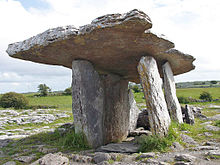Irish megalithic tombs

Megalithic monuments in Ireland typically represent one of several types of megalithic tombs: court cairns, passage tombs, portal tombs and wedge tombs.[1][2] The remains of over 1,000 such megalithic tombs have been recorded around Ireland.[3]
Types
[edit]Court tombs
[edit]These tombs have an open east-facing entrance court which leads into a number of rectangular chambers (up to four). The chambers are roofed on the inside by corbelling. Each of these chambers may contain inhumations and cremated remains. Surrounding these chambers is a low dry stone wall with orthostats at the extremities. Sometimes they are called a lobster-claw cairn
Passage tombs
[edit]The passage tomb is a large mound of earth or stone with a narrow passage leading from outside to a central chamber or chambers. Examples of this type include Newgrange, Knowth, and Dowth.
Portal tombs
[edit]Portal tombs (often referred to as dolmens) are mainly located in the northern half of the country. Such tombs have a straight sided chamber often narrowed at the rear. The entrance is marked by tall portal stones. On top lies a huge single cap stone resting on the portal stones on the front and sloping at the rear where it rests on the backstone. In the majority of cases the tomb entrance faces the east towards the sunrise. This is not always the case though as many tombs face different directions. Examples of portal tombs include Kilmogue, County Kilkenny; Poulnabrone in the Burren, County Clare; and Knockeen, County Waterford.
Wedge tombs
[edit]
These tombs are generally found in the west and north west of Ireland. Their sloping roof and narrowing walls at one end produce their characteristic wedge shape.
Distribution by province
[edit]The number and location of tombs in each province of Ireland are recorded by the Irish National Monument Service (Republic of Ireland) and in the Northern Ireland Sites & Monuments Record (Northern Ireland).[4][5] The distribution of each type of tomb, by province, can be summarised as:
| Court Tomb | Passage Tomb | Portal Tomb | Wedge Tomb | |
|---|---|---|---|---|
| Leinster | 11 | 83 | 24 | 19 |
| Munster | 7 | 9 | 21 | 337 |
| Connacht | 197 | 90 | 44 | 125 |
| Ulster | 185 | 37 | 96 | 88 |
Many hundreds of other "unclassified" megalithic tombs and sites are also recorded.[4][5][6]
References
[edit]- ^ de Valera, Ruaidhrí; Ó'Nualláin, Seán (1961). Survey of the Megalithic Tombs of Ireland. Dublin: Ordnance Survey (Ireland).
- ^ Twohig, Elizabeth Shee (2004). Irish Megalithic Tombs. Shire Archaeology. ISBN 9780747805984.
- ^ "The tombs of our ancestors" (PDF). archaeology.ie. 28 January 2012. Retrieved 10 September 2020.
There are remains of over 1,000 known megalithic tombs in Ireland
- ^ a b "Historic Environment Viewer". webgis.archaeology.ie. National Monuments Service. Retrieved 11 September 2020.
- ^ a b "Northern Ireland Sites & Monuments Record". apps.communities-ni.gov.uk. Department for Communities. Retrieved 11 September 2020.
- ^ Ó'Nualláin, Seán (1989). Survey of the Megalithic Tombs of Ireland (PDF). Vol. V – County Sligo. Irish Government Stationery Office.
[there are] 128 Co. Sligo megalithic tombs comprising fifty-nine court-tombs, thirty-five wedge-tombs, eleven portal-tombs and twenty-three others which are left unclassified. Six of the unclassified tombs have been totally destroyed
